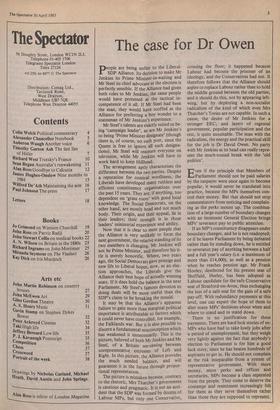The case for Dr Owen
People are being unfair to the Liberal- SDP Alliance. Its decision to make Mr Jenkins its Prime Minister-in-waiting and Mr Steel its chief advocate at the election is perfectly sensible. If the Alliance had given both roles to Mr Jenkins, the same people would have protested at the tactical in- competence of it all. If Mr Steel had been the man, they would have scoffed at the Alliance for preferring a boy wonder to a statesman of Mr Jenkins's experience.
Mr Steel's talents are exactly suited to be- ing 'campaign leader', as are Mr Jenkins's to being 'Prime Minister designate' (though there is, of course, no such post, since the Queen is free to ignore all such designa- tions). Mr Steel will reassure everyone on television, while Mr Jenkins will have to work hard to keep Hillhead. The arrangement aptly characterises the difference between the two parties. Despite a reputation for comical woolliness, the Liberals have developed many ruthless and efficient constituency organisations over the past 15 years. They are, if anything, too dependent on 'grass roots' with good local knowledge. The Social Democrats, on the other hand, are mostly head and not much body. Their origin, and their appeal, lie in their leaders; their strength is in those leaders' ministerial experience and ability. Now that it is clear to most people that the Alliance is very unlikely to form the next government, the relative standing of its two members is changing. Mr Jenkins will not be Prime Minister, and therefore his ti- tle is merely honorific. Where, two years ago, the Social Democrats gave prestige and new life to Liberal hopes, now, as an elec- tion approaches, the Liberals give the Alliance their best hope of actually winning seats. If it does hold the balance in the next Parliament, Mr Steel's famous devotion to doing deals will be more useful than the SDP's claim to be breaking the mould. It may be that the Alliance's apparent failure to gain more than marginal political importance is attributable to factors which it could never have controlled, for example, the Falklands war. But it is also possible to discern a fundamental misconception which has weakened it unnecessarily. This is the picture, beloved of both Mr Jenkins and Mr Steel, of a Britain see-sawing between unrepresentative extremes of Left and Right. In this picture, the Alliance provides the much needed balance, and will guarantee it in the future through propor- tional representation.
The picture is mistaken because, contrary to the rhetoric, Mrs Thatcher's government is cautious and pragmatic. It is not an acci- dent that the SDP was formed by dozens of Labour MPs, but only one Conservative, crossing the floor; it happened because Labour had become the prisoner of an ideology, and the Conservatives had not. It therefore follows that the Alliance should aspire to replace Labour rather than to hold the middle ground between the old parties, and it should do this, not by appearing left- wing, but by deploying a non-socialist radicalism of the kind of which even Mrs Thatcher's Tories are not capable. In such a cause, the desire of Mr Jenkins for a stronger EEC, and layers of regional government, popular participation and the rest, is quite unsuitable. The man with the radicalism, the energy and the practical skill for the job is Dr David Owen. No party with Mr Jenkins at its head can really repre- sent the much-touted break with the 'old politics'.
Even if the principle that Members of
Even
should not be paid salaries by the taxpayer were once again to become popular, it would never be translated into practice, because the MPs themselves con- trol their money. But that should not stop commentators from noticing and complain- ing as the perks mount up. The combina- tion of a large number of boundary changes with an imminent General Election brings MPs' severance pay to public attention.
If an MP's constituency disappears under boundary changes, and he is not readopted; or if he leaves Parliament by being defeated rather than by standing down, he is entitled to severance pay of anything between a half and a full year's salary (i.e. a maximum of more than £14,000), as well as a pension when he reaches pension age. Mr Frank Hooley, deselected for his present seat of Sheffield, Heeley, has been adopted as Labour candidate for the safe Conservative seat of Stratford-on-Avon, thus exchanging the loss of a safe seat for the gain of a safe pay-off. With redundancy payments at this level, one can expect the hope of them to alter many MPs' decisions about when and where to stand and to stand down.
There is no justification for these payments. There are hard luck stories of ex- MPs who have had to take lowly jobs after a period of unemployment, but they weigh very lightly against the fact that anybody's election to Parliament is for him a good luck story, since he has beaten hundreds of aspirants to get in. He should not complain at the risk inseparable from a system of representative government. With more money, more perks and offices and secretaries, MPs become a class separated from the people. They come to deserve the contempt and resentment increasingly felt for them as they serve themselves rather than those they are supposed to represent.










































 Previous page
Previous page